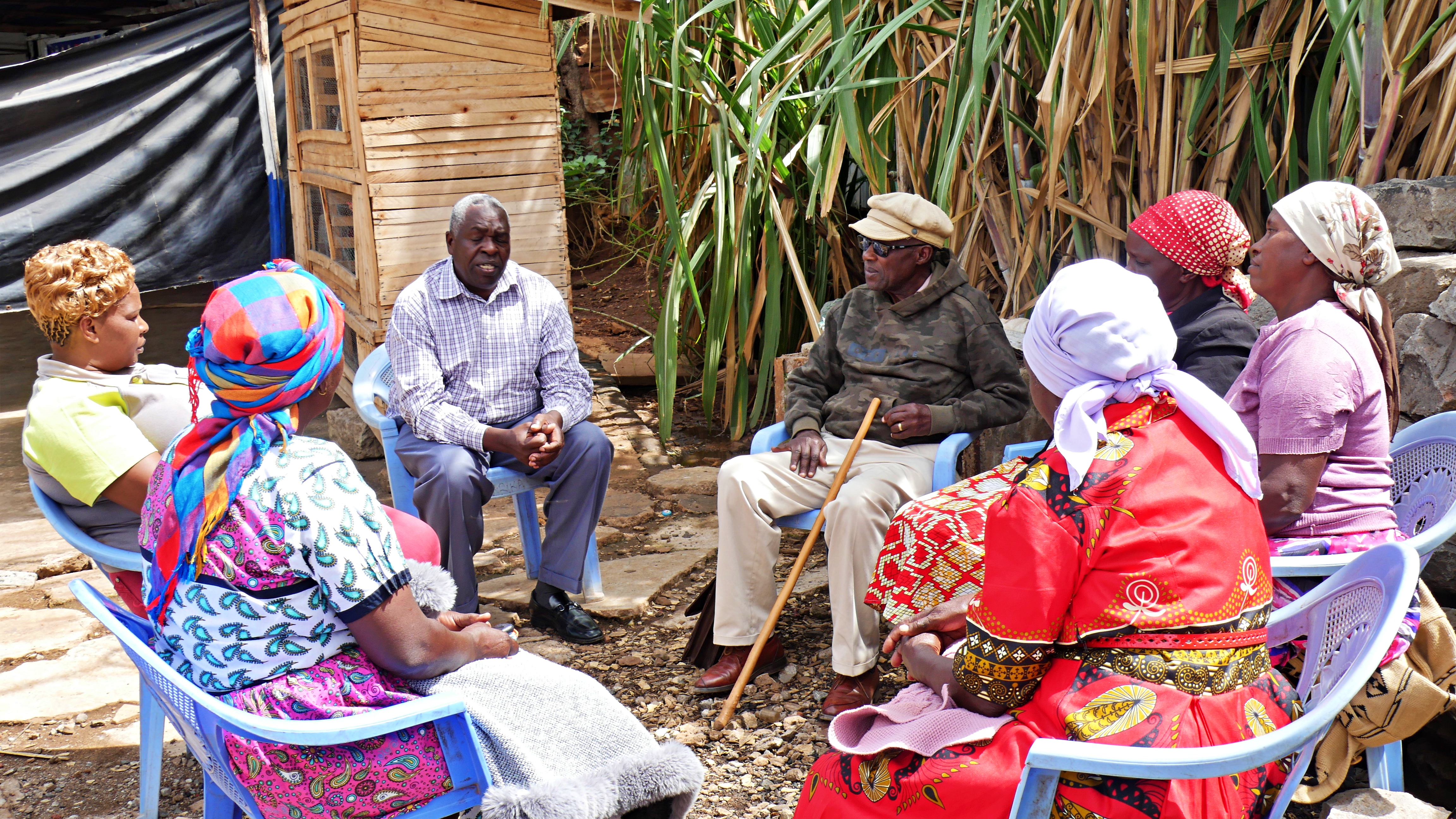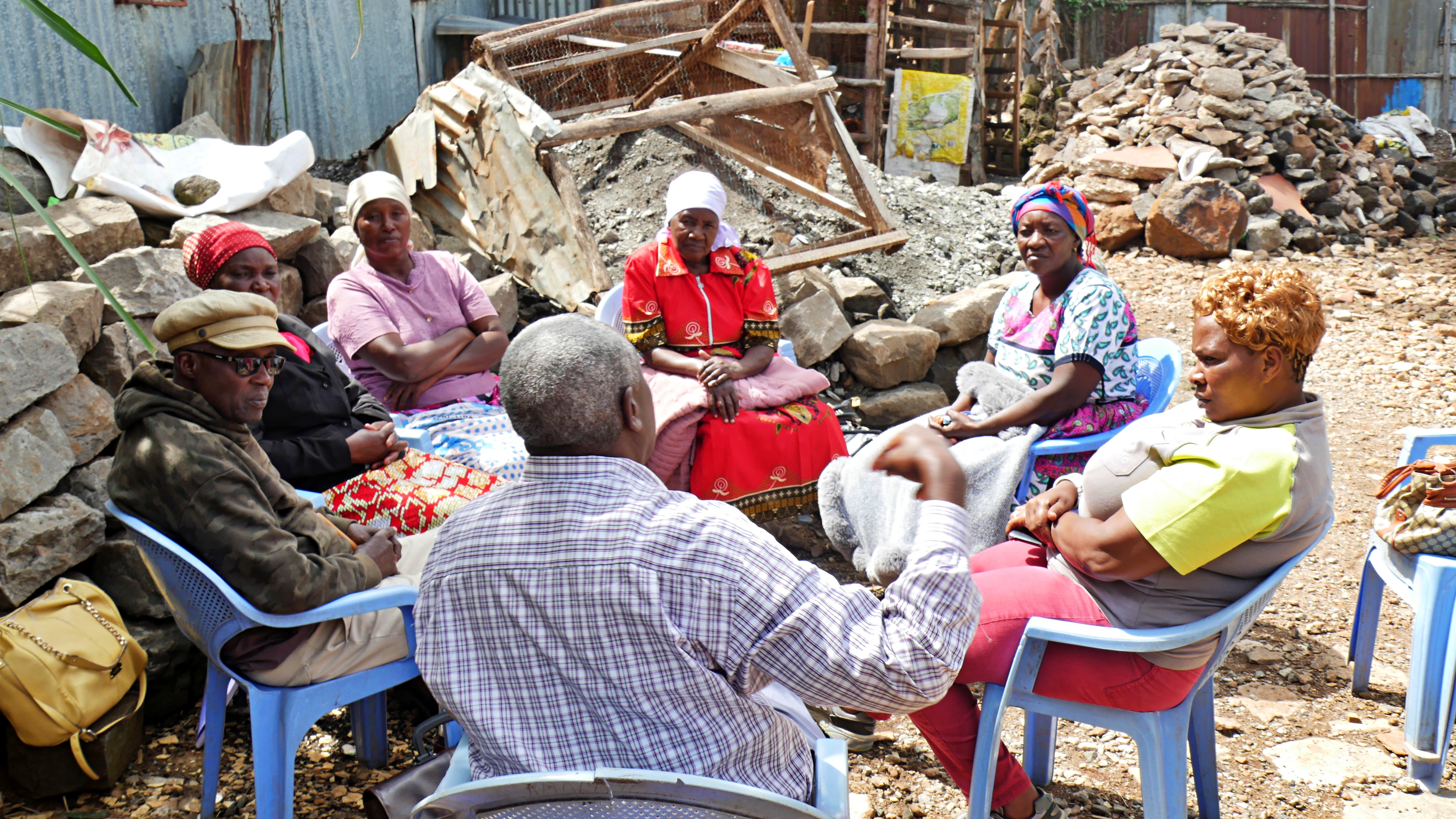Kenyan Aged Require Information, Knowledge, and Advancement (KARIKA) is a community-based organization located in Nairobi that focuses on aging. Founded in 2003, KARIKA initially began as a self-help group to address the financial insecurity of older people, particularly those responsible for orphaned or vulnerable children, through age-friendly income generating activities such as soapmaking or weaving. Today, KARIKA also engages in political advocacy in addition to programming that addresses the economic, social, nutritional, and health needs of older Kenyans. AARP International interviewed Elijah Mwega, KARIKA’s founder to learn more about the organization and its goals.
Download Interview
AARP What are the major challenges that older people in Kenya face? How does KARIKA Kenya address those challenges?
Elijah Mwega Here in Kenya the government is not committed to the greater and meaningful involvement of older persons in all national development agendas. Political goodwill is lacking and there is no targeted policy or other legal instrument to address the plight of older persons. Our children are moving to other cities and countries.
 This leads to a lack of investment in social protection, income security, legal frameworks, family and community support mechanisms, access to information, and health care — all in addition to loneliness, depression, and abuse.
This leads to a lack of investment in social protection, income security, legal frameworks, family and community support mechanisms, access to information, and health care — all in addition to loneliness, depression, and abuse.
There has been a loss of focus toward the well-being of older people from both the government and the public.
In addressing these challenges, KARIKA leads lobbying and advocacy campaigns and works with like-minded institutions, individuals, and groups for older people. Our organization then forms networks and coalitions with the goal of having a strong national voice for older people in Kenya to reach the government and other service providers.
KARIKA has been conducting targeted group capacity building, training on group dynamics, and home visits addressing healthy aging issues among older persons. We also provide food to older people in critical conditions and connect some of them with pro bono lawyers or other relevant service providers.
AARP How does KARIKA Kenya define success? Which of KARIKA Kenya’s projects have been most successful? What challenges has the organization faced during project implementation?
 EM KARIKA defines success through outcomes of set goals. These have been our most successful projects:
EM KARIKA defines success through outcomes of set goals. These have been our most successful projects:
- Mobilizing for and acquiring government land where we built our permanent KARIKA headquarters in Dagoretti, Nairobi County
- Building KARIKA Kenya to become a nationally and internationally recognized organization
- Lobbying for the national policy on ageing and older persons, the development of national standards and guidelines for the institutions of older people, and the review of the Madrid Plan of Action on Aging
- Having KARIKA accepted as a HelpAge International global network member
- Mobilizing older people groups in more than 15 counties in the country
- Forming a KARIKA relationship with media stations
Challenges to these projects included the following:
- Lack of financial support
- Lack of political goodwill
- Community cultural life
- Inadequate community awareness
- Lack of human resources and community support
- Physical insecurity
AARP How does KARIKA Kenya collaborate with government or nongovernment groups to accomplish its goals?
EM When we build our relations with target audiences and offices, we are guided by our mission, vision, and strategic plan of action. On some occasions, our partnerships require special agreements and signatures in the presence of a witness.
As a result of our collaborations, KARIKA has been able to take older people to national museums to learn, free of charge, any time they want. We have a good relationship with both Kenyatta and Nairobi universities where we have supported research on the well-being of older persons. With the support of HelpAge International, we created a community health worker training kit.
We work closely with county government health departments and social development departments to achieve our goals. With the Ministry of Health, we have been pushing for an older people department and to move older people from general wards to age-friendly rooms in government hospitals. A few years ago, the Ministry started a small unit of aging, and late last year, they upgraded to a geriatrics and gerontology division.
Finally, we participated in developing a report about implementing Integrated Care for Older People. This document targets the entire health workforce, including medical doctors, clinical officers, nurses, laboratory technicians, nutritionists, and rehabilitative services.
AARP How does KARIKA Kenya help create intergenerational connections?
EM KARIKA conducts empowerment forums and events that bring older persons and youth together. During these sessions, the youth meet with the older persons. Older adults share wisdom, whereas the youth give knowledge, especially on how to use digital technology and current trends in the market (e.g., how to use android phones). Older adults also instill virtues in the youth and provide mentoring. KARIKA helps older people go to children’s homes for storytelling. We use both local and mainstream media to reach the unreachable young people. We target messages through printed materials, posters, T-shirts, etc.
AARP How does your team connect with new volunteers? What types of support do these volunteers provide? What do volunteers take away from their work with KARIKA Kenya?
EM We find volunteers through our networks and collaboration with other organizations and friends, sometimes through the internet. They support us by sharing skills, connecting KARIKA to other parts of the world, and offering financial support. Our volunteers also participate in our daily activities and meet with older people. They have been instrumental in bridging the international gap and in advocating for the rights and welfare of older persons.
The volunteers gain skills and knowledge about how to engage with older persons from different cultures in the country. Sometimes they lead visits to the game parks and natural reserves, and we give them guidance.
We provide appreciation or participation certificates upon request for all volunteers.
AARP How has the COVID-19 pandemic affected your work?
EM COVID-19 changed many of our members’ perceptions of safety.
We started thinking about new ways of working. Older people usually meet at KARIKA’s center, but during this period, challenges included loneliness, isolation, social distancing, lack of counseling for those with depression, lack of food, difficulty in reaching service providers, stigma, and announcements of bad news all the time from the government.
But not all was lost. KARIKA benefited from the support of the Agence Française de Développement through which we bought food and protective materials for our older people.
The Embassy of Iraq donated funds to build medical rooms and an administration office for us as well. We will never forget this.
AARP How does KARIKA Kenya’s Adopt-a-Grandparent program work?
EM We have a program and funding for the adoption of older people in need. We first identify the health and security needs of older persons.
Then we register their identification documents for security purposes and provide them with the services that we have available.
If someone wishes to sponsor the adoption of an older person through KARIKA, they can choose to provide food, medication, and/or income.
For more information, visit: https://karikakenya.or.ke